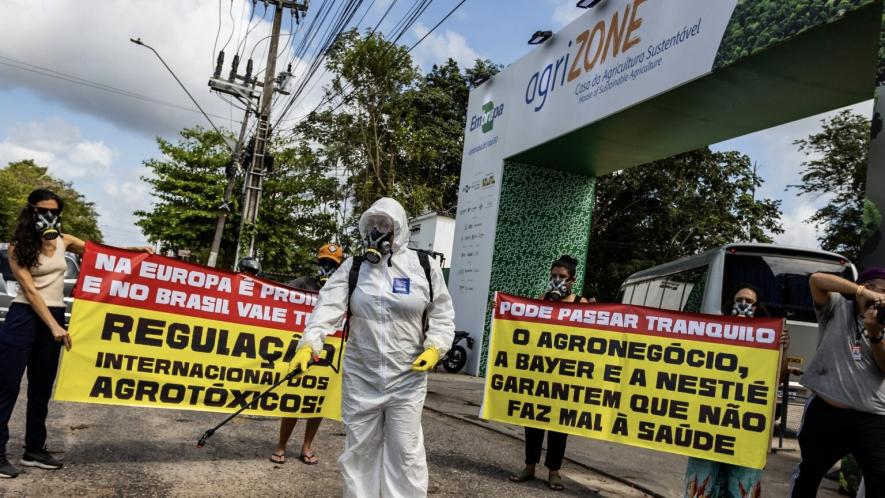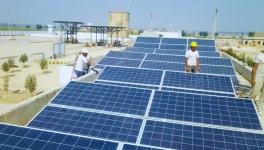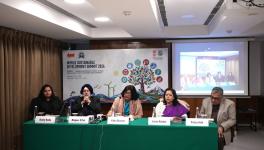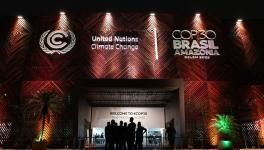COP30: Corporate Capture Undermines Progress

Protesters denounced the contamination of the Cerrado by pesticides at the entrance to COP30's Agrizone. More than 70% of the pesticides used in Brazil are used in the Cerrado, many of which are banned in Europe. Photo: Oliver Kornblihtt / Mídia NINJA
This year’s COP30 was met with considerable criticism, including for its failure to meaningfully address the dangers the climate crisis poses to health. At the same time, major food and agro-industry corporations – playing a central role in the erosion of both health and environment – were present at the forum. Many activists and Indigenous communities sounded the alarm, especially considering these companies continue to threaten people’s health and livelihoods through land grabs, pesticide use, and the marketing of ultra-processed foods (UPFs).
Together with new attempts by Global North governments to avoid taking financial responsibility for their contributions to the climate crisis, concerns over corporate participation and capture left many observers with the impression that COP30 fell far short of what is needed. The hope in Belém rested instead with grassroots initiatives.
UPF and agroindustry giants at COP
Reporters from the Brazilian media project O Joio e o Trigo documented the influence exerted by agribusiness throughout both the preparation and implementation of COP30. They noted that some key documents intended to outline a more sustainable agricultural vision were, in reality, heavily influenced by industry actors. One of the documents, for example, proposed that today’s agro-industrial model is capable of ending world hunger without harming communities or the planet. These claims, the reporters argue, are deeply misleading, not least because they sidestep the most urgent dangers arising from industrial agriculture.
One of the most glaring omissions in this context was the impact of pesticide use in Brazil’s agricultural sector. “If pesticides are ignored, then the harms they cause are ignored as well; that silence is deafening at a time when evidence of communities harmed by pesticide exposure, and growing suspicion about its link to rising cancer rates, is rapidly accumulating,” O Joio e o Trigo warned.
Companies with documented histories of undermining human and planetary health were present front and center at COP30. Bayer and Nestlé, for example, hosted flashy booths. Nestlé apparently drew visitors by offering free coffee and chocolate drinks. This coincided almost perfectly with the publication of a new series in The Lancet, which singled out the company as a major actor in global food industry networks working to derail public health regulations that aim to mitigate the consequences of UPF consumption. The environmental footprint of producing UPFs alone could be reason enough to treat such corporate participation with skepticism, yet similar companies still manage to position themselves as legitimate participants in discussion on climate change.
A radically different vision came from the tens of thousands who participated in alternative events and marches outside COP30 official spaces. Many, including activists from the People’s Health Movement (PHM), assembled through the People’s Summit. The meeting’s declaration identifies actors such as Big Food as central drivers of the climate crisis. “Transnational corporations, in collusion with governments in the Global North, are at the center of power in the capitalist, racist and patriarchal system, being the actors that most cause and benefit from the multiple crises we face,” the document states.
Activists argue that a genuine shift in addressing the climate crisis can only be achieved by placing grassroots movements at the center. “If today, here in Belém do Pará, international politics, the environment, and climate change are under debate, those who are most affected by these climate shifts must be at the forefront,” physiotherapist and parliamentarian Vivi Reis told Outra Saúde.
“It’s already clear that, in practice, COPs have had little influence in the fight against climate change, and that real answers and alternatives are actually built by those on the ground,” Reis said.
Unlike corporations, whose so-called solutions rely on fossil fuels, land devastation, and extractivism, grassroots movements are advancing models rooted in social justice and ancestral knowledge. “Peoples produce healthy food to feed the people, in order to eliminate hunger in the world, based on cooperation and access to techniques and technologies under popular control,” the People’s Summit declaration states. “This is an example of a real solution to confront the climate crisis,” it adds, emphasizing the need for popular agrarian reform and agroecology.
The declaration also names connections between other ongoing trends in the Global North, namely militarism, and the climate crisis, emphasizing again that a meaningful transition must be comprehensive and address all sources of injustice. “We demand an end to wars, we demand demilitarization,” it reads. “That all financial resources allocated to wars and the war industry be redirected to the transformation of this world. [We demand] that military spending be directed towards the repair and recovery of regions affected by climate disasters.”
People’s Health Dispatch is a fortnightly bulletin published by the People’s Health Movement and Peoples Dispatch. For more articles and to subscribe to People’s Health Dispatch, click here.
Courtesy: Peoples Dispatch
Get the latest reports & analysis with people's perspective on Protests, movements & deep analytical videos, discussions of the current affairs in your Telegram app. Subscribe to NewsClick's Telegram channel & get Real-Time updates on stories, as they get published on our website.
























